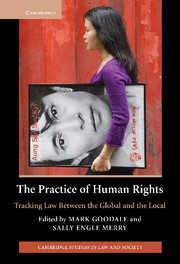Book contents
- Frontmatter
- Contents
- Contributors
- Acknowledgments
- Introduction Locating rights, envisioning law between the global and the local
- PART ONE STATES OF VIOLENCE
- PART TWO REGISTERS OF POWER
- PART THREE CONDITIONS OF VULNERABILITY
- PART FOUR ENCOUNTERING AMBIVALENCE
- Introduction
- 7 Transnational legal conflict between peasants and corporations in Burma: human rights and discursive ambivalence under the US Alien Tort Claims Act
- 8 Being Swazi, being human: custom, constitutionalism and human rights in an African polity
- Conclusion Tyrannosaurus lex: the anthropology of human rights and transnational law
- Index
- References
7 - Transnational legal conflict between peasants and corporations in Burma: human rights and discursive ambivalence under the US Alien Tort Claims Act
Published online by Cambridge University Press: 29 March 2011
- Frontmatter
- Contents
- Contributors
- Acknowledgments
- Introduction Locating rights, envisioning law between the global and the local
- PART ONE STATES OF VIOLENCE
- PART TWO REGISTERS OF POWER
- PART THREE CONDITIONS OF VULNERABILITY
- PART FOUR ENCOUNTERING AMBIVALENCE
- Introduction
- 7 Transnational legal conflict between peasants and corporations in Burma: human rights and discursive ambivalence under the US Alien Tort Claims Act
- 8 Being Swazi, being human: custom, constitutionalism and human rights in an African polity
- Conclusion Tyrannosaurus lex: the anthropology of human rights and transnational law
- Index
- References
Summary
INTRODUCTION
In the 1990s, Unocal Oil Corporation made a deal with the authoritarian government of Myanmar (Burma) to build the Yadana Project, a natural gas pipeline. As part of that deal, the military junta that runs Myanmar forced local villagers to work for Unocal under some of the most deplorable conditions imaginable. The junta forced the peasants from their homes and made them work literally at gunpoint. Soldiers from Myanmar's army raped, tortured and, in some cases, murdered the forced laborers. Doe v. Unocal Corp., 963 F Supp 880 (C.D. Cal. 1997). They also used the workers as human shields and munitions porters against other peasants, often from their own villages, who the government had branded as rebels. The peasants working for Unocal on the Yadana Project were slaves – joining the ranks of the 27 million other people held as slaves in the world today (Bales 1999: 8–9).
Peasants such as those forced to work on the Yadana Project have little power within Burma. In 1988, they participated in a statewide pro-democracy movement that the military junta brutally crushed. The crackdown in Burma was bloodier than the one the following year in Tiananmen Square in Beijing, China. However, it received little international attention because it was not televised. Best estimates suggest that the death toll ranged from 3,000 to 5,000 citizens.
- Type
- Chapter
- Information
- The Practice of Human RightsTracking Law between the Global and the Local, pp. 285 - 319Publisher: Cambridge University PressPrint publication year: 2007
References
- 1
- Cited by



